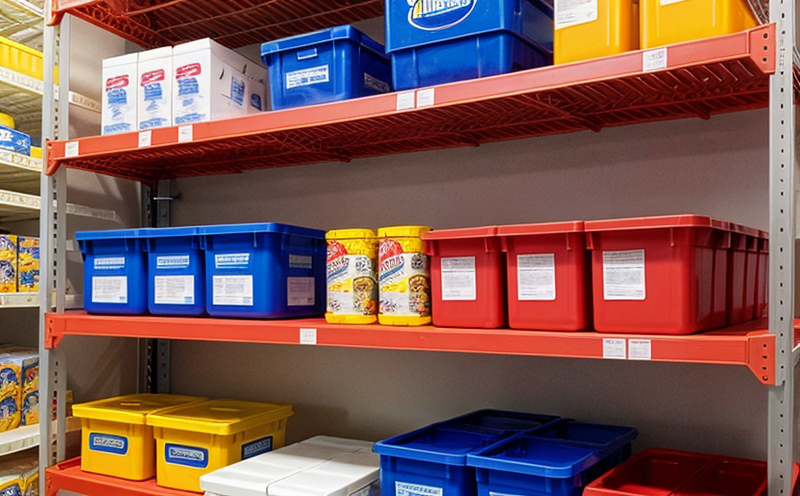ISO 124932 Shelf Life Testing in Energy Drinks
The shelf life testing of energy drinks as per ISO 124932 is a critical process that ensures the safety, quality, and efficacy of these products throughout their intended storage period. This service aims to verify the stability and integrity of energy drink formulations under various environmental conditions such as temperature, humidity, light exposure, and shelf age. Compliance with this standard is essential for manufacturers to meet regulatory requirements and ensure consumer trust.
The testing procedure involves simulating real-world storage conditions in controlled environments designed to accelerate degradation processes. This allows the manufacturer to predict potential quality issues before they affect end-users. The ISO 124932 method specifically addresses the stability of energy drinks, focusing on key parameters like nutrient content, flavor profile, and color retention.
The testing process begins with the selection of appropriate samples that represent the product batch. These samples are then subjected to accelerated aging conditions according to the specified protocol in ISO 124932. The environmental stress factors, such as temperature and humidity, are carefully controlled to mimic long-term storage scenarios without compromising sample integrity.
During testing, the stability of each parameter is monitored at regular intervals. This includes measuring changes in nutrient content using spectroscopic analysis, assessing color retention through spectrophotometry, and evaluating flavor profile by sensory evaluation. The results from these tests are compared against baseline data to determine whether any significant deviations have occurred.
The testing process also involves monitoring the physical properties of the energy drink over time. This includes viscosity changes which can indicate phase separation or sediment formation, as well as particle size distribution that might affect mouthfeel and texture. Additionally, microbial stability is assessed by culturing samples at defined intervals to ensure shelf life safety.
The use of advanced analytical techniques such as high-performance liquid chromatography (HPLC) for nutrient analysis, Fourier transform infrared spectroscopy (FTIR) for molecular structure examination, and gas chromatography mass spectrometry (GC-MS) for volatile compounds identification adds precision to the results. These methods provide detailed insights into how each component within the energy drink behaves under various conditions.
The final step in this shelf life testing process is generating comprehensive reports that summarize all findings from the tests conducted. These reports serve as valuable tools for quality assurance teams, R&D departments, and regulatory compliance officers by providing evidence of product stability over extended periods. They help guide decisions regarding packaging changes, labeling updates, and potential market launches.
By adhering to ISO 124932 standards during shelf life testing, manufacturers can ensure their energy drinks remain safe, effective, and enjoyable throughout the entire shelf life period. This commitment not only enhances consumer satisfaction but also strengthens brand reputation in competitive markets.
Applied Standards
The primary standard utilized for this service is ISO 124932, which provides comprehensive guidelines on conducting shelf life testing of energy drinks. This international standard ensures that all aspects of the testing process are standardized across different regions and industries.
- ISO 124932: Method for determining shelf life of food products (energy drinks)
In addition to ISO 124932, we also adhere to other relevant standards such as IEC 60598-2-22 and EN 50171 when necessary. These additional standards help ensure that our testing methods are aligned with global best practices.
Industry Applications
| Application Area | Description |
|---|---|
| Manufacturing | To ensure consistency in product quality and meet regulatory requirements. |
| R&D | To identify potential issues early on so they can be addressed before launch. |
| Sales & Marketing | To support claims about the longevity of products, enhancing consumer confidence. |
| Supply Chain Management | To optimize inventory management and reduce waste due to expired goods. |
The application of ISO 124932 shelf life testing extends beyond just energy drinks. It is equally applicable to other categories within the food & feed sector, including sports nutrition supplements, vitamin waters, and meal replacement shakes. By leveraging this standardized approach, companies across these sectors can confidently extend their product lifecycle while maintaining high standards of safety and efficacy.
Quality and Reliability Assurance
- Consistency in Results: Rigorous adherence to ISO 124932 ensures consistent outcomes across multiple batches of the same product.
- Early Detection of Issues: By identifying problems early, potential issues can be addressed promptly before they impact broader markets.
- Enhanced Consumer Confidence: Transparent reporting based on reliable testing builds trust among consumers and stakeholders alike.
The implementation of strict quality control measures throughout the shelf life testing process helps maintain product integrity. This includes regular calibration of instruments, strict adherence to procedural protocols, and meticulous documentation of all steps taken during each test cycle.





